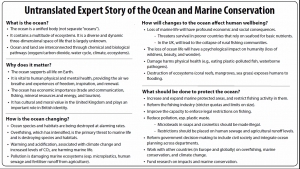Identifying the untranslated story of the ocean

That’s something we’ve known right from the start of scoping the work both the Lisbon and UK branches of the Calouste Gulbenkian Foundation are doing on marine conservation.
But we also know that we must have a clear ‘story’ that we and our partners can communicate to the public so people properly understand what threats like overfishing and pollution are doing to the ocean – and what they can do about them.
To help us develop this, we engaged the FrameWorks Institute, an expert in conducting communications research, to distil the key ideas and information that we believe people need to understand.
Over the past couple of months, FrameWorks researchers have conducted interviews with a range of experts working on marine issues from scientific, advocacy, and policy perspectives.
Initial findings were presented to the Marine CoLABoration group and other experts at ZSL London Zoo in July, provoking an engaged and lively debate.
What’s next
FrameWorks will now go and refine the ‘expert story’ in light of this discussion. At the same time, it will identify the ‘cultural models’ (that’s the widely shared and deeply held patterns of thought about social issues) that people use when thinking about the ocean and marine conservation through a series of in-depth and ‘on-the-street’ interviews with the UK public.
Then FrameWorks will put this all together by writing a strategy which ‘maps the gaps’ between expert and public understandings of ocean and marine conservation issues. This analysis will identify key communications challenges and establish initial strategic recommendations for navigating expert messages through non-expert understanding.

